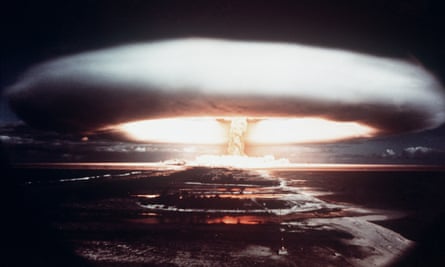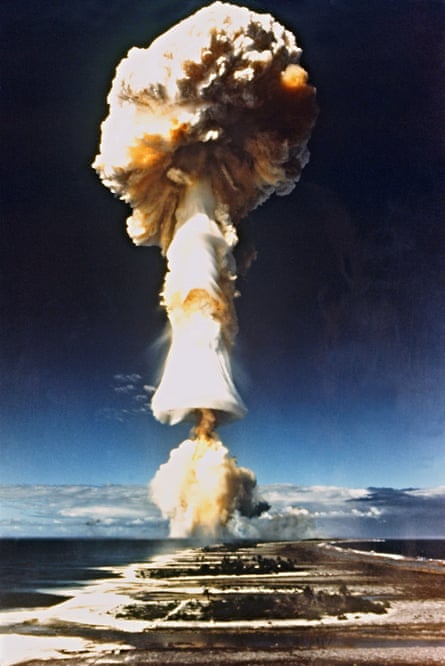
Now that nuclear weapons are illegal, the Pacific demands truth on decades of testing
Posted: 25th October 2020
From the Guardian
With a 50th nation ratifying it, the treaty outlawing nuclear weapons for all countries will come into force in 90 days
 A French nuclear test on Mururoa atoll in 1971. Photograph: AFP
A French nuclear test on Mururoa atoll in 1971. Photograph: AFPNuclear weapons will soon be illegal. Just over 75 years since their devastation was first unleashed on the world, the global community has rallied to bring into force a ban through the Treaty on the Prohibition of Nuclear Weapons.
Late on Saturday night in New York, the 50th country – the central American nation of Honduras – ratified the treaty.
It will become international law in 90 days.
For many across the Pacific region, this is a momentous achievement and one that has been long called for. Over the second half of the 20th century 315 nuclear weapons tests were conducted by so-called “friendly” or colonising forces in the Marshall Islands, Kiribati, Australia and Maohi Nui(French Polynesia).
The United States, Britain and France used largely colonised lands to test their nuclear weapons, leaving behind not only harmful physical legacies but psychological and political scars as well.
Survivors of these tests and their descendants have continued to raise their voices against these weapons. They are vocal resisters and educators, the reluctant but intense knowledge holders of the nuclear reality of our region.

In the formation of the nuclear ban treaty, Pacific survivor voices were prominent alongside those of Hibakusha survivors from Japan.
Pacific islands were early adopters of the treaty. Fiji, Kiribati, Palau, Samoa, Vanuatu, Tuvalu, New Zealand and Nauru have signed and ratified. Niue and Cook Islands have acceded.
Australia is notably absent, reflecting the vested interests of its alliance partner the United States, and a misplaced reliance on outdated and opaque doctrines of extended nuclear deterrence.
And the treaty is set to become law despite opposition from the five original nuclear powers, the US, Russia, China, Britain and France. The Trump administration has written to treaty signatories saying the treaty is “a strategic error” and urging them to rescind their ratifications.
In contrast, for many Pacific nations the lived experience of 50 years of nuclear testing still drives their stance today.
On the day Fiji ratified the treaty this year, the country’s high commissioner to the United Nations, Dr Satyendra Prasad, said:
Pacific Islanders continue to be exposed to nuclear radiation. Nuclear explosions, we know very well, do not observe national borders, they don’t respect visa regimes, nor does nuclear waste respect time – it remains for generations.
For many survivors the intergenerational impacts of the testing remain central to justice.
Aunty Sue Coleman-Haseldine, a Kokatha-Mula woman from South Australia, was a child when she was subjected to nuclear fallout from the British nuclear testing in the 1950s.
She declared in an address to a UN conference in 2014: “We want nuclear weapons permanently banned and the uranium that can create them left in the ground. If you love your own children and care for the children of the world, you will find the courage to stand up and say ‘enough’.”

The unresolved injustice in the region drives many to support the new treaty, which bans the use, threat of use and the testing of nuclear weapons.
Amongst its objectives, there are what are termed “positive obligations”. These include assistance to victims of nuclear weapons use and testing, as well as environmental remediation for areas affected — a marked shift to include humanitarian law alongside more traditional nuclear disarmament law.
The treaty calls for “age and gender-sensitive assistance … including medical care, rehabilitation and psychological support”. But importantly it does not abrogate responsibility for those who used nuclear weapons.
A former Marshall Islands foreign minister, the late Tony de Brum, spoke often of the long-term impact of US nuclear testing on his people. He frequently recalled his own childhood experience of the tests.
Every time one of those things went off, it was yet another trauma – I would challenge anyone to live through 12 years of testing in the Marshalls, that does not come away with a permanent scar somewhere in your system. That is a mark of that period.
The legacy of environmental, human and cultural harms is compounded by immense grief and frustration due to opaque record keeping and deliberate subterfuge on behalf of the states responsible for the testing.
Historical truth-telling will be key to nuclear justice for many across the Pacific.
Calling for an opening up of nuclear testing records held by the US, de Brum said: “You cannot continue to withhold the necessary information that we need in order to make decisions on issues that are fair and proper for our people.”
We need a new commitment to transparency and accountability from all nations involved in historic nuclear testing. After generations of nuclear experimentation, the impacts of these weapons tests and resulting nuclear waste across lands and ocean remain to be studied across the Pacific.
The removal of historical silences is necessary for such studies to even begin.
This new treaty enters international law with many promises for nuclear justice.
It is well past time.
Dimity Hawkins AM is a PhD candidate at Swinburne University researching nuclear weapons testing in the Pacific. She is a co-founder of the International Campaign to Abolish Nuclear Weapons (Ican), which won the 2017 Nobel peace prize

